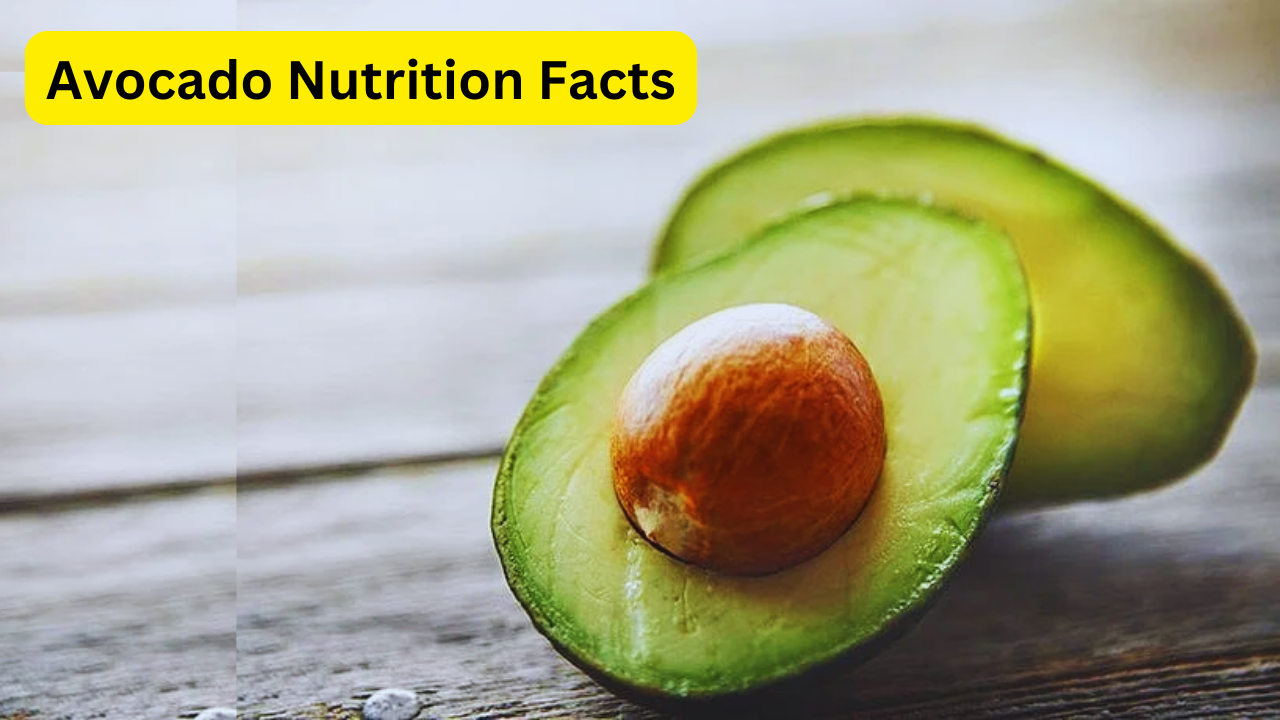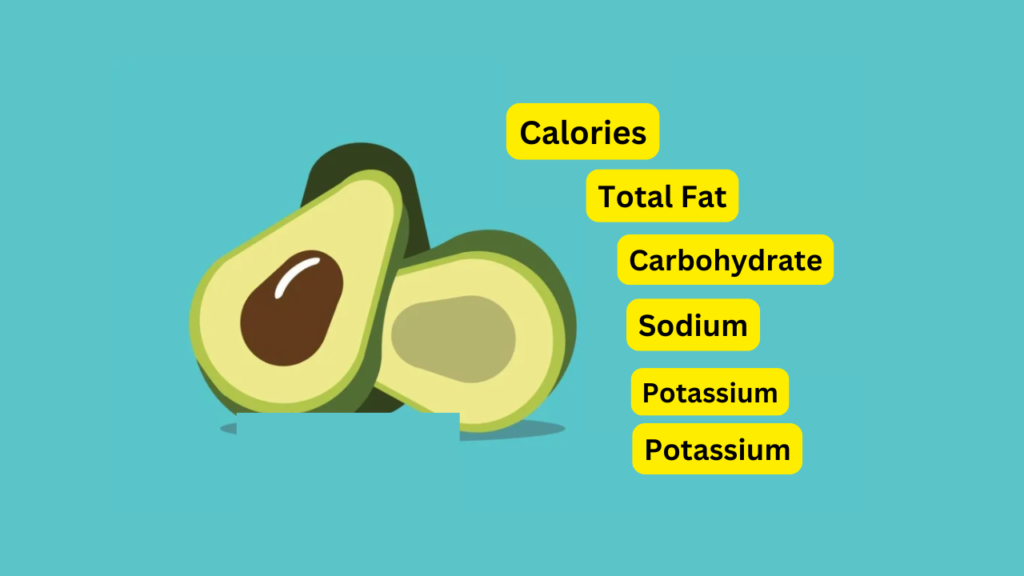
Delicious, nutritious, and versatile, avocados have become a staple in kitchens worldwide. Some people call avocados fruits, while others think of them as vegetables, but they are basically fruits, particularly berries. They belong to the Lauraceae plant family, which contains the cinnamon tree as well.
Originally from Central America and Mexico, avocados are now grown in many parts of the globe, including North America. In the U.S., California leads in avocado production, boasting over 5,000 farms that produce more than 400 million pounds of avocados annually.
Avocados are incredibly famous in the health and wellness community due to their rich nutritional profile and numerous health benefits. This article explores the avocado nutrition facts.
Avocado Nutrition Facts

A 100-gram serving of avocado, which is half of the fruit, contains 160 calories. It also offers 14.7 grams of fat, 2 grams of protein, and 8.5 grams of carbohydrates. Avocado nutrition facts mean this fruit have a lot of important nutrients like potassium, magnesium, vitamin K, vitamin C, and vitamin E. The USDA provides the following avocado nutritional facts for 100 grams of avocado.
- Carbohydrates: 8.53 grams
- Calories: 160
- Sugars: 0.66 grams
- Fat: 14.7 grams
- Sodium: 7 milligrams
- Protein: 2 grams
- Fiber: 6.7 grams
Carbohydrates
Avocados stand out among other fruits for their minimal sugar content. In 100 grams or half an avocado, there are only 0.66 grams of sugar, including fructose, glucose, galactose, and sucrose. The net digestible carbohydrates are only 1.8g per 100g of avocado. The net digestible carbohydrates are only 1.8 grams per 100 grams of avocado.
Due to their low sugar levels, avocados have an expected glycemic index score of around zero. This suggests that they are unlikely to cause a significant spike in blood sugar levels.
Fiber
Most of the carbohydrates in avocados, about 79%, come from fiber. In a 100-gram portion of avocado nutrition facts, you will get 6.7 grams of fiber, which is quite high and accounts for 24% of the daily recommended value for a person.
Dietary fiber is a crucial part of our diet, offering numerous health benefits. It helps control appetite, supports beneficial gut bacteria, and lowers the risk of various diseases like depression, heart disease, type 2 diabetes, stroke, and obesity.
Furthermore, avocados have FODMAPs, which are short-chain carbs that some individuals find hard to digest. While not everybody is sensitive to FODMAPs, they can cause uncomfortable digestive issues for those suffering from irritable bowel syndrome (IBS).
Calories
The calorie content of an avocado varies with its size. The nutrition facts on an avocado provided here are for half of a medium avocado. However, avocados can be smaller or much larger, sometimes weighing up to 300g or more. The USDA Nutrient Database shows that a larger avocado weighing 201g contains 322 calories.
Typically, an average avocado contains between 200 and 300 calories. When you add a little avocado to your healthy taco or sprinkle a thin layer on your sandwich, you’re likely eating around two tablespoons, or about 30g of the fruit.
Protein
100g of avocado contains around 2g of protein. Although it isn’t a high-protein fruit, it can still contribute to your daily protein consumption goals.
Fats
A whole avocado contains about 30g of fat, including 3.6g of polyunsaturated fat, 4.2g of saturated fat, and nearly 20g of monounsaturated fat. Therefore, while avocados are high in fat, most of it is the healthier monounsaturated type. Monounsaturated fatty acids (MUFAs) are derived from plants and remain liquid at room temperature, thickening when chilled.
MUFAs can help lower “bad” cholesterol or LDL. This is why the Academy of Nutrition and Dietetics advises choosing foods rich in monounsaturated fats over those high in saturated fats. Avocado oil is an excellent source of beneficial fats, and research on animals shows it may help protect against diabetes, inflammation, and heart disease.
Vitamins and Minerals
Avocados are packed with a variety of essential vitamins and minerals. Some of them are:
- Folate (B-9): Avocados are rich in folate. It’s crucial for tissue growth and cell function and particularly important for pregnant women.
- Vitamin K-1: This vitamin is essential for blood clotting and might also support bone health.
- Potassium: An avocado has more potassium than a banana. Potassium helps control blood pressure and supports heart health.
- Copper: Avocados are an excellent source of copper, a trace element that is often lacking in Western diets. Not getting enough copper can negatively impact heart health.
- Vitamin E: Known for its antioxidant properties, Vitamin E is found in high amounts in avocados and other fatty plant foods.
- Vitamin B-6: This vitamin assists in converting food into energy.
- Vitamin C: An important antioxidant for skin health and immune function, Vitamin C is also present in avocados.
The table below details the vitamins and minerals in avocados per 100 g, listed in micrograms (mcg) or milligrams (mg).
| Name of the vitamins and minerals | Amount milligrams, micrograms | % Daily recommended value |
| Vitamin B-6 | 0.26 milligrams | 15% |
| Vitamin B-5 | 1.39 milligrams | 28% |
| Folate | 81 micrograms | 20% |
| Copper | 0.19 milligrams | 21% |
| Vitamin C | 10 milligrams | 11% |
| Vitamin B-2 | 0.13 milligrams | 10% |
| Potassium | 485 milligrams | 10% |
| Vitamin K | 21 micrograms | 18% |
| Vitamin B-3 | 1.74 milligrams | 11% |
| Manganese | 0.14 milligrams | 6% |
| Vitamin E | 2.07 milligrams | 14% |
| Magnesium | 29 milligrams | 7% |
| Vitamin A | 7 micrograms | 1% |
| Vitamin B-1 | 0.07 milligrams | 6% |
| Choline | 14.2 milligrams | 3% |
| Zinc | 0.64 milligrams | 6% |
Other Plant Compounds
Below are the major plant compounds found in avocados:
Persenones A and B: These unique antioxidants have the potential to protect against cancer and inflammation.
Carotenoids: Avocados are rich in carotenoids like zeaxanthin and lutein, which are crucial for maintaining eye health and might help lower the risk of age-related eye conditions.
Due to their high fat content, avocados enable the body to efficiently absorb the carotenoid antioxidants they contain.
Avocado Nutrition Facts: What Are The Advantages?

Avocados are packed with antioxidants and a variety of essential nutrients, some of which are uncommon in modern diets. So, it’s no wonder that avocados offer a wide range of health benefits.
Supports Heart Health
Heart disease holds the harsh title of the world’s leading cause of death. Studies have found a connection between elevated levels of blood cholesterol, blood pressure, inflammatory markers, and triglycerides with a higher risk of developing heart disease.
Research indicates that eating avocados can significantly lower triglycerides and blood cholesterol. They also help reduce dangerous low-density lipoprotein cholesterol while boosting beneficial high-density lipoprotein cholesterol.
Promotes Weight Loss
Even though avocados are calorie-dense, they can still be beneficial for weight loss. Their savory flavor and creamy texture, which come from fats, can assist you in feeling full and satisfied during meals. In addition, avocados are a good source of fiber, which can enhance feelings of fullness.
Research has linked eating avocados with a smaller waist circumference, lower body weight, and reduced body mass index (BMI). Some limited studies also suggest that regularly consuming avocados may help with weight loss and lower the risk of becoming overweight.
Decreases Metabolic Syndrome Risk
After analyzing data from the National Health and Nutrition Examination Survey, researchers found that eating avocados was linked to a reduced risk of metabolic syndrome. They also observed that avocado consumption was associated with an overall improvement in diet quality.
Closing Remarks on Avocado Nutrition Facts

Avocados are packed with a remarkable array of nutrients, including high levels of fiber, vitamin B6, potassium, vitamin C, vitamin E, copper, and folate. Regularly incorporating avocados into your diet can offer numerous health benefits, such as enhancing overall diet quality, protecting against heart disease, supporting gut health, and increasing feelings of fullness.
In addition, they are delicious and versatile. Avocados are a fantastic addition to a healthy diet. I hope this article has provided you with valuable information on avocado nutrition facts.
